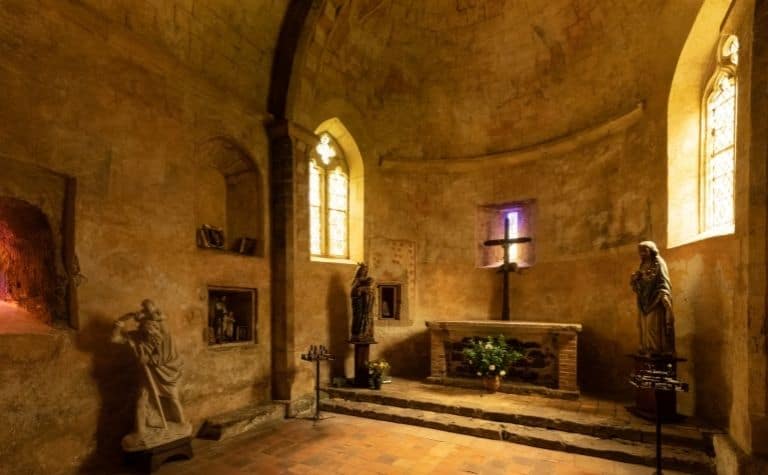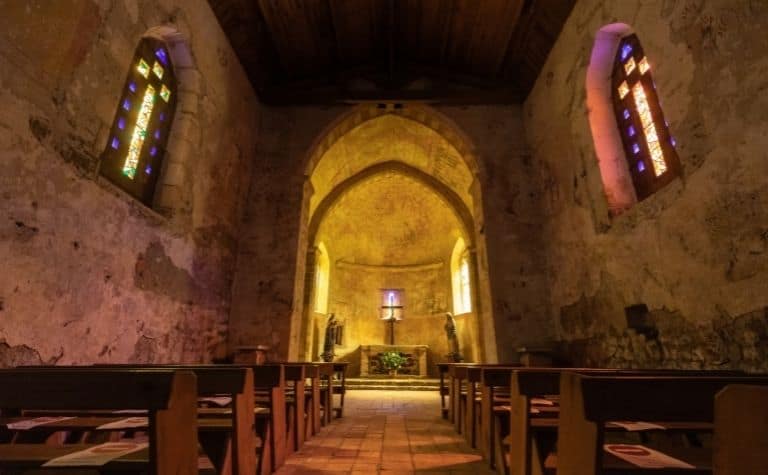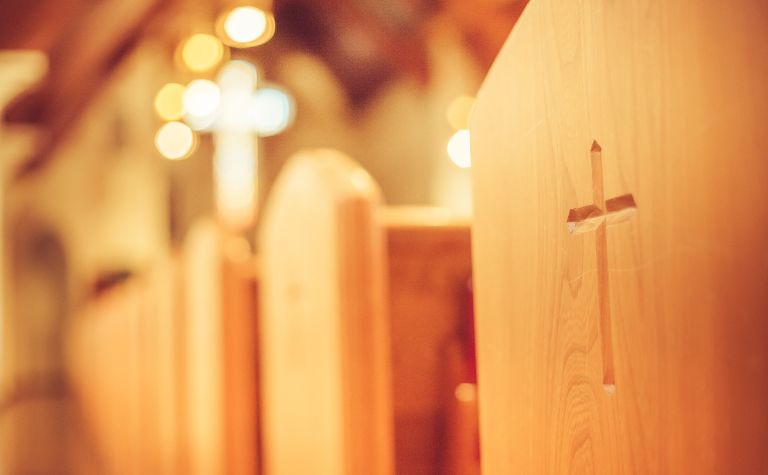Roman Catholicism is one of the three historical branches of the Christian religion, Protestantism and Eastern Orthodoxy. On the other hand, pentecostalism is one of the fastest-growing movements in the 500-year history of Protestantism. So what are the similarities and differences between Catholicism and Pentecostalism?
As Protestant Christians, Pentecostals believe the Bible is the believer’s sole authority for doctrine and behavior. Roman Catholicism teaches that the Bible and the Church are both authoritative. Differences regarding the Eucharist, Mary, and the sacraments can be traced to their beliefs about authority.
What are the central commitments of Pentecostalism and Catholicism? How do their origins, convictions, and worldviews differ? What is the same and different about their beliefs regarding human leaders, the Bible, the sacraments, the saints, and Mary? Keep reading to learn the answers to these questions and more.
Also, see Pentecostal vs. Charismatic: What’s the Difference? to learn more.

Pentecostalism and Catholicism: Comparison
The similarities between Pentecostals and Catholics are important. Both traditions believe similarly about many of the core doctrines of the Christian faith, like the Trinity — the Father, Son (Jesus Christ), and the Holy Spirit — are each fully God, the inspiration of Scripture, original sin, the resurrection of Christ, and in the Second Coming of Christ. Yet, their differences are significant, too.
| OVERVIEW | Pentecostalism | Catholicism |
|---|---|---|
| Name | As a Protestant denomination, Pentecostalism subscribes to the core convictions of the Reformation: salvation is by grace alone, through faith alone, in Christ alone. Pentecostals believe baptism in the Holy Spirit occurs after conversion and that speaking in tongues is the initial evidence. | The word “Roman” is derived from the city of Rome, Italy. “Catholic” literally means “universal” or “global” or something similar. When “Catholic” is used in the context of “Roman Catholic,” it refers to the historic branch within the Christian religion. |
| Branch of Christianity | Pentecostalism is a Protestant Christian tradition. Many of the ideas it embraces are rooted in the Protestant Reformation, led by Martin Luther of Germany, Ulrich Zwingli of Switzerland, and John Calvin of France. | Catholicism traces its origins to Christ and the Apostle Peter (Matt. 16:18-19), who the Catholic church believes was the first Bishop of Rome and Vicar of Christ on Earth. |
| Central commitments | As a Protestant denomination, Pentecostalism subscribes to the core convictions of the Reformation: salvation is by grace alone, through faith alone, in Christ alone. Pentecostals believe that baptism in the Holy Spirit occurs after conversion and that speaking in tongues is the initial evidence of it. | The pope is the Vicar of Christ; Scripture and tradition are authoritative; justification involves forgiveness and sanctification; the sacraments are channels of God’s grace; Mass and the Eucharist are primary theological matters. |
| Origin and Founder | Like other Protestants, Pentecostals trace their origins to the book of Acts through the Protestant Reformation. The modern Pentecostal movement started at the Azusa Street Revival under the leadership of William J. Seymour in Los Angeles, California in 1906. | Roman Catholicism traces its origins to the Apostle Peter. |
| Theological and Social worldview | Pentecostal denominations and churches tend to be conservative theologically and in relation to social issues. | The leadership and doctrine of the Roman Catholic are generally conservative. Individual Catholics may be conservative or liberal in their social wordlview. |
*Pentecostalism is a belief system, not a denomination. However, certain denominations adhere to Pentecostal doctrines and practices, like the Assemblies of God and the Church of God (Cleveland, Tennessee).
Individuals with Pentecostal convictions sometimes attend churches that haven’t fully subscribed to Pentecostal theology, so Pentecostal believers may attend churches that are Baptist, Methodist, Nazarene, and others.
Also, see Pentecostal vs. Church of God: What’s the Difference? to learn more.

Pentecostalism and Catholicism: Beliefs and Practices
Do Pentecostals and Catholics consider each other to be Christians? Some Pentecostals believe Catholics are Christian, and some don’t. Some believe Catholicism possesses truth but obscures it with unbiblical doctrines rooted in the teachings and proclamations of various popes.
The Catholic Church teaches that people can be saved in Protestant churches, although their experience of Christ without the Eucharist is less pure, holy, and fulfilling. (Also see Can a Pentecostal Marry a Catholic?)
Protestant Christianity, including the Pentecostal tradition, considers itself a truer or purer form of Christianity than Catholicism because Scripture is their authority. According to their convictions, they only follow God’s Word, not God’s Word, plus man’s word (i.e., the teachings of the Catholic Church).
Catholicism considers itself a truer and purer form of the faith, over and above Protestant traditions, because of (1) their commitment to Scripture, (2) they follow the Pope, who is the Vicar of Christ on Earth, and (3) they receive the Eucharist. (Also see Do Pentecostals Drink Alcohol?)
| Pentecostalism | Catholicism |
|---|---|
| Human Leader: Catholicism teaches that the Pope is the Vicar (i.e., representative or deputy) of Christ and the head of the Church on Earth. This office finds its origin in the ministry of the Apostle Peter. | The Bible: God inspired the writings of Scripture. It alone is authoritative for Christians and the Church. Pentecostals don’t read the Apocrypha or Deuterocanonical books. |
| Ordinance/sacraments: Pentecostalism has two sacraments, baptism, and the Lord’s Supper because those are the only ones Christ specifically taught. They aren’t considered channels of God’s grace. | The Bible: God inspired the writings of Scripture. The Bible and the Catholic church are authoritative. Catholic Bibles include the Apocrypha or Deuteron- canonical books. |
| Infant baptism: Pentecostals practice “believer’s baptism” instead of infant baptism. Baptism isn’t required for salvation. | Ordinance/sacraments: Catholic teaching refers to these practices as “ordinances”: adult and infant baptism, confirmation, the Eucharist, penance, anointing, ordination, and marriage. These practices are channels of God’s grace, according to Catholic theology. |
| The Lord’s Supper: Also called “the Eucharist,” it is a memorial in which the elements of the bread and cup become the body and blood of Christ (i.e., “transubstantiation”). | Infant baptism: Catholicism practices paedobaptism, i.e., “child baptism” or infant baptism. Children of Catholic parents are baptized to cleanse them of original sin and regenerate them. |
| The Lord’s Supper: Pentecostals believe the bread and the cup are memorials of Christ’s death. They don’t believe that the elements literally become the body and blood of Christ. | Saints: Like other Protestants, Pentecostals believe the Bible uses the term “saints” to describe all believers, not a select few. Pentecostals honor believers no longer living on Earth, but don’t venerate them or pray to them. |
| Mary: The Pentecostal tradition honors Mary, the mother of Jesus for her devotion to God. They don’t pray to her but seek to learn from her story in the Bible and strive to imitate her faithful obedience. | Saints: In Catholic teaching, believers who have lived with great virtue and honor may be considered for canonization after physical death. Believers who are still living on Earth venerate the saints, in part by asking them for prayer and blessings. |
| Mary: The Pentecostal tradition honors Mary, the mother of Jesus, for her devotion to God. They don’t pray to her but seek to learn from her story in the Bible and strive to imitate her faithful obedience. | Mary: Catholicism teaches that Mary, referred to as “the Mother of God,” was virgin born, lived a sinless life, reversed Eve’s disobedience, was a perpetual virgin, was raptured to heaven, and is an advocate and co-mediator. |
| Spiritual gifts: An important doctrine distinguishing Pentecostals from other Protestants and Catholics is their beliefs about baptism in the Holy Spirit and speaking in tongues.* | Religious orders: The term describes men (e.g., priests) and women (e.g., nuns) who have fully devoted themselves to a certain form of religious life, which includes poverty, chastity, and obedience. |
| Spiritual gifts: An important doctrine that distinguishes Pentecostals from other Protestants and Catholics is their beliefs about baptism in the Holy Spirit and speaking in tongues.* | Spiritual gifts: The Catholic Church isn’t universally opposed to spiritual gifts like speaking in tongues but suggests believers seek and practice the gift with caution, discernment, and love for others that don’t share their convictions. |
*Unlike other Protestants, not just Catholics, Pentecostals believe that the baptism of the Holy Spirit occurs after conversion. However, most Christians believe the Bible teaches that it occurs during conversion. Furthermore, speaking in tongues is the initial evidence of being baptized in the Holy Spirit, according to Pentecostal theology.
Speaking in tongues isn’t necessary for salvation, but it increases a person’s devotion to God, helps them overcome sin, and empowers them for ministry.
Also, see What Do Pentecostals Believe? to learn more.
Please see the related articles below.

References:
[1] Source
[2] Source
[3] Source
Related Articles
Catholic vs. Protestant vs. Orthodox: What's the Difference?
Roman Catholicism, Protestant Christianity, and the Eastern Orthodox Church are the three historical branches of the Christian religion. Each tradition traces its doctrines and practices to the New...
Pentecostalism vs. Charismatic Movement: What's the Difference?
Many people know that the terms "Pentecostal" and "charismatic" are associated with certain beliefs, churches, and people in modern Christianity but aren't sure how they compare. Although the terms...
